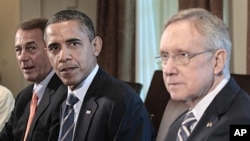In Washington, efforts continue to break an impasse over raising the nation’s debt limit and avoid the United States defaulting on its financial obligations for the first time in history. The dispute over allowing the government to borrow more money to meet its obligations pits President Barack Obama and his Democratic allies in Congress against the Republican opposition, which took control of the House of Representatives in last year’s congressional elections.
This latest test for divided government in the United States has enormous implications, not just domestically, but around the world.
Obama administration officials warn that the United States will default on its existing debt obligations unless Congress acts to raise the $14.3 trillion debt ceiling by August 2.
A default would have a huge impact on the U.S. economy and would also cause a ripple effect in international markets, says financial analyst Greg McBride.
“This is something we are all going to feel. Financial markets would roll over and it is something we would feel in our retirement accounts and college savings accounts. But perhaps even worse is that the flow of credit could come to a screeching halt,” McBride said.
Both sides in the debt debate say they want to avoid a default. But getting to an agreement is proving difficult in large part because of differences over raising taxes.
President Obama and his Democratic allies in Congress are willing to agree to huge cuts in government spending, but only if Republicans give up their opposition to raising taxes on the wealthiest Americans as part of any deal to agree to raise the debt limit.
Mr. Obama faces a tough re-election campaign next year given the weak domestic economy and analysts say he is trying to appeal to centrist voters with his stance on the debt negotiations, voters he won in 2008 and voters he will need again to prevail in next year’s election.
“We can defy the expectations that we are always thinking in terms of short-term politics and the next election, and every once in a while we break out of that and we do what is right for the country,” he said.
Republicans are sticking to their no-tax increase pledge because they believe they have the upper hand in this political dispute, pointing to public-opinion polls that show Americans want to cut spending and reduce the budget deficit.
House Speaker John Boehner is also under pressure from fellow Republicans elected to Congress last year with help from Tea Party activists to uphold pledges to oppose tax increases and to dramatically reduce the size of the federal government.
“Our disagreement is over the idea of raising taxes on the very people that we are asking to create jobs in our country. The American people will not accept and the House cannot pass a bill that raises taxes on job creators,” Boehner said.
The debate over whether to emphasize budget cuts or tax increases to solve budget problems is not new and lawmakers generally found a way to reach a compromise in past disputes. But this time the differences are stark, says Washington-based analyst Stuart Rothenberg.
“Republicans and Democrats have a very different view. For Republicans, it is all about cutting taxes and smaller government. The Democrats say, 'Yes, we need to restrain some of our spending, we need to cut some of the deficit, but we also need to raise additional revenue,' and there is a big gap between the parties on this,” Rothenberg said.
President Obama has also indicated he is willing to consider savings for popular government programs like the Social Security pension system and the Medicare program that provides low-cost health care for the elderly.
Democrats have long sought to protect both programs from Republican cost-cutting moves, and MSNBC political analyst Richard Wolffe says it shows Mr. Obama is willing to upset his own party in the search for a long-term solution to reducing the debt. Wolffe spoke on VOA’s Issues in the News program.
“The challenge for this president is that he has got to try and keep enough of his own [Democratic] votes together. But really what he wants to do is reshape the budget and reshape the political landscape,” Wolffe said.
Economic and political experts warn that failure to raise the debt ceiling could jeopardize the tepid economic recovery, which in turn could be disastrous for President Obama’s re-election hopes next year.
Analyst Stuart Rothenberg says the political stakes for Mr. Obama are huge.
“And consumer sentiment is down and that is a significant problem because it reflects the public’s sense of fear, concern, worry, even anger at the president and the politicians’ inability to do anything,” Rothenberg said.
Complicating the debate in Washington is the fact that polls show the American public is sharply divided on raising the debt ceiling. Surveys show Republican voters tend to oppose or doubt the need to raise the borrowing limit, while Democratic voters tend to support the idea, fearing a negative economic impact if the Congress fails to act.
Sharp Party Differences Over Taxes Define US Debt Debate




